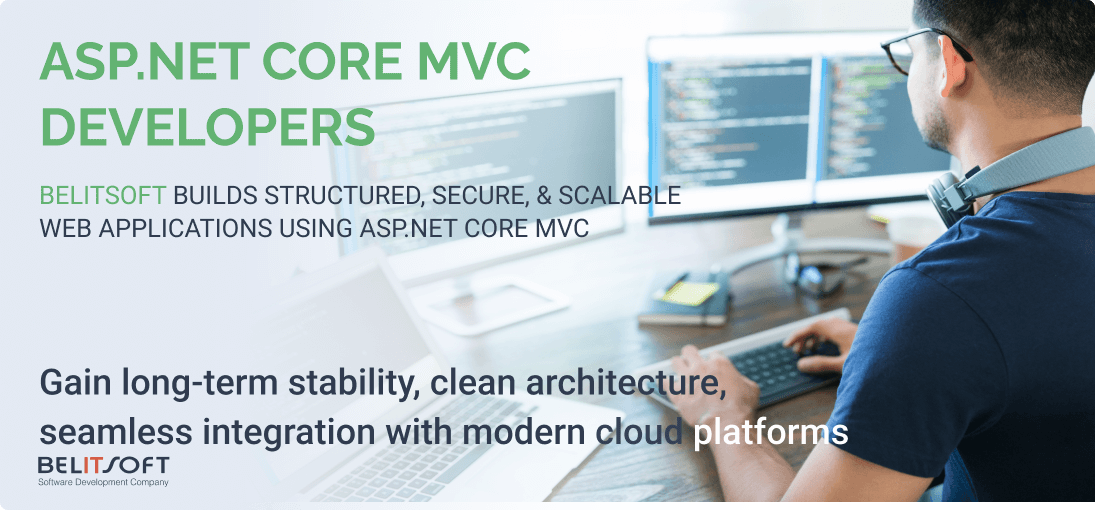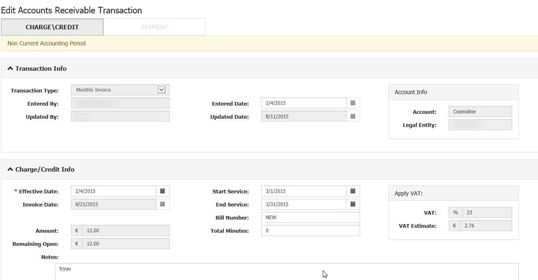ASP.NET Core is cross-platform and fast, and MVC rides on top of it. In 2025 the pattern is still actual. Blazor and Minimal APIs make sense, but when teams need a data-driven, server-rendered app - or a rock-solid API - they default to MVC with its separate layers, easy tests, loads of built-ins. That is gold for big enterprises - banks, hospitals, insurers keep their MVC stacks alive. MVC also inherits every new .NET boost - faster JIT, tighter security, cloud-native hooks. Hiring proves the point - companies still chase MVC talent to nurse legacy apps and guide them toward the modern stuff.
Core Capabilities of an ASP.NET Core MVC Developer
An ASP.NET Core MVC developer in 2025 needs broad, integrated skills. They master .NET and C#, use OOP, generics, async/await and LINQ. Apps are structured with MVC - models, Razor views and controllers - exposed through convention or attribute routing.
On the back end they craft logic, data and REST APIs (inside MVC or standalone) and document them with Swagger. Data runs through Entity Framework Core - DbContext, DbSet, code- or database-first models, migrations, performance-tuned LINQ - with raw SQL or stored procedures when needed. Solid SQL (table design, keys, indexes, transactions) spans SQL Server, PostgreSQL and MySQL.
Security? ASP.NET Core Identity, RBAC, JWTs, OAuth 2.1 and Data Protection APIs, plus defense against XSS, CSRF and SQL injection via anti-forgery tokens, strict validation, parameterised queries and universal HTTPS.
Quality and delivery hinge on unit tests (xUnit/NUnit), integration tests (TestHost), BDD (SpecFlow) and end-to-end checks (Selenium/Playwright) run in CI/CD pipelines that fit Agile DevOps practices, driven by dotnet CLI, MSBuild and Git, automated with GitHub Actions, Azure Pipelines, Jenkins or TeamCity. Apps ship in Docker, scale with Kubernetes and - because most systems live in the cloud - run on Azure, AWS or GCP, often serverless on Azure Functions.
Modern, distributed, threat-exposed software demands this end-to-end skillset. Just knowing the MVC request/response loop is not enough. ASP.NET Core meets the challenge with integrated EF Core, Identity, a built-in DI container, centralized configuration and a flexible middleware pipeline, removing most third-party glue and making MVC a fast, secure, maintainable choice for serious cloud applications.
Looking to modernize or scale your ASP.NET Core MVC applications? Partner with Belitsoft to refactor legacy systems, implement secure integrations, and leverage proven expertise in .NET development for enterprise-ready solutions.
Applying ASP.NET Core MVC requires understanding the contexts, challenges, and requirements of different industries.

Healthcare Use Cases
ASP.NET Core MVC powers the everyday workflows of modern care. On the front line, it runs secure patient portals where people book visits, read trimmed-down chart summaries pulled from EHRs, message clinicians, get pill reminders and pay bills.
Behind the scenes, it sits between otherwise incompatible systems, acting as a FHIR-speaking middleware layer that moves data between portals, hospital EHR/EMR back-ends and insurers.
The same framework drives telehealth backends - handling sign-in, visit scheduling and consultation records while handing the live audio/video stream to specialist services - and it fuels in-house dashboards that let staff track patient cohorts, review operational metrics, manage resources and tap AI decision support.
Developer Capabilities to Expect in Healthcare
To build and safely run that stack, engineers need deep HIPAA literacy: Privacy, Security and Transactions Rules, plus practical encryption in transit and at rest, MFA, RBAC, audit trails, data-minimization and secure disposal.
They must write healthcare-grade secure code, audit it, and exploit .NET features such as ASP.NET Core Identity and the Data Protection API while locking down PHI databases with field-level encryption and fine-grained access.
Fluency in HL7 FHIR and other interoperability standards is essential for designing, consuming and hardening APIs that stitch together EHRs, billing engines and remote devices - work that blurs into systems integration.
The structured MVC pattern, strong C# typing and baked-in HTTPS make ASP.NET Core a defensible choice, but only when wielded by developers who can marry those features with rigorous security and integration discipline.

Fintech Use Cases
Banks and FinTechs rely on ASP .NET Core MVC for four broad workloads.
First, full online-banking portals: server-side code renders secure pages where customers check balances and history, move money, pay bills, and edit profiles, all structured cleanly by MVC.
Second, FinTech service back-ends: the framework powers the core logic and APIs behind automated-lending engines, payment processors, investment platforms, personal-finance aggregators and regulatory-reporting tools. Even when a separate front-end exists, MVC still serves admin dashboards and niche web components.
Third, analyst dashboards: web views that aggregate data in real time to show portfolio performance, risk metrics and compliance status to internal teams or clients.
Fourth, payment-processing integrations: server modules that talk to gateways such as Stripe or Verifone - or run bespoke settlement code - while guaranteeing transaction integrity.
Developer Capabilities to Expect in Fintech
To ship those workloads, developers must first master security and compliance. PCI DSS calls for fire-walled network design, strong encryption at rest and in transit, tight access controls, defensive coding, continuous patching and routine audits; GDPR, PSD2 and other rules add further duties, often automated through RegTech hooks.
Performance comes next: high-volume systems demand efficient database access, asynchronous flows, caching and fault-tolerant architecture to stay highly available.
Every modern solution also exposes APIs, so robust authentication, authorization, threat-mitigation and OAuth-based design are core skills - whether for mobile apps, Open-Banking partners or internal micro-services.
AI/ML is rising fast - teams embed ML.NET models or cloud AI services for fraud detection, credit scoring, risk forecasting and personalized advice.
Finally, the platform choice itself matters: ASP.NET Core MVC offers proven speed, a respected security stack, a mature ecosystem and familiar UI patterns for portals - yet the sector’s FinTech, Open-Banking and embedded-finance waves mean API-centric thinking is now just as essential as classic MVC page building.

Logistics Use Cases
Logistics software spans four main web applications.
- Warehouse-management modules: a web front-end plus back-end logic that track each item’s location, quantity, status, run put-away and picking tasks, optimize worker routes, print performance reports, and let operators or managers adjust system rules.
- End-to-end supply-chain platforms: multi-site inventory oversight, order processing, supplier relationship handling, shipping coordination, shipment tracking and analytics - all frequently built on ASP.NET Core MVC.
- Real-time tracking portals: public or internal sites that surface live status, position, ETA and history of each shipment by consuming carrier feeds, GPS signals and other trackers.
- Focused inventory systems: tools that watch stock levels, trigger re-orders via forecasts or Min-Max rules, record receipts/issues/transfers and expose detailed inventory visibility.
Developer Capabilities to Expect in Logistics
To ship the above, developers must knit together data from GPS units, IoT sensors, carrier and ERP APIs - handling many formats, latency and sync issues - often with SignalR/WebSockets for instant UI refresh.
They integrate still more APIs (ERP, carrier rating/tracking, IoT, mapping and AI/ML services), design high-volume databases for items, orders, shipments, events, locations and suppliers with tuned queries, and understand logistics staples: JIT, MRP, fulfillment cycles, wave/batch picking, demand planning, transport and reverse logistics.
They increasingly embed AI for demand forecasts, route optimization, warehouse automation and risk assessment, craft ingestion pipelines that maintain consistency, and implement heavy back-end algorithms such as dynamic routing, automated forecasting and rules-based replenishment - using ASP.NET Core for the engine and MVC chiefly for admin/config screens.
Strong analytical and algorithmic skills are therefore as vital as UI work.

Manufacturing Use Cases
Manufacturing software in ASP.NET Core MVC normally falls into four buckets.
- Integration layers tie MES to ERP: they pull production orders down to machines, push confirmations back up, log material use, sync inventory, and shuttle quality data; ISA-95 shapes the mappings and MVC supplies the setup/monitor screens.
- Real-time dashboards let managers see schedules, machine states, OEE, material use, quality metrics, and instant alerts fed live from PLCs, sensors, or MES.
- Quality-control apps record inspections, track non-conformances and corrective actions, keep batch-level traceability, and print compliance reports.
- Inventory/resource planners watch raw materials, WIP, and finished goods, run (or couple to) MRP so procurement and scheduling follow demand forecasts and bills of material.
Developer Capabilities to Expect in Manufacturing
To ship the above, teams need true IT–OT range. They must speak MES, SCADA, PLC, and ERP protocols, grasp ISA-95, and reconcile the two camps’ different data models, latencies, and security rules (BI tools sit on the IT side).
They also need IoT depth: factories stream sensor data at high volume and with mixed, often non-standard protocols, so code must safely ingest, store, and analyze it - SignalR-style push keeps dashboards live.
Databases have to hold time-series production logs, quality records, traceability chains, and inventory - all fast at scale.
Because downtime stops lines, the stack must be fault-tolerant and ready for predictive-maintenance analytics.
Finally, the rising swarm of edge devices, diverse hardware, and absent universal standards means secure device management, microservice-scale architectures, and cross-hardware agility are mandatory - making IoT-enabled manufacturing software far tougher than ordinary web work.

E-commerce Use Cases
Modern e-commerce on ASP.NET Core MVC revolves around four tightly linked arenas.
First is the online-store backend itself: a data-heavy engine that stores catalogs, authenticates shoppers, runs carts and checkout, and serves site content.
Sitting beside it is an order-management module that receives each purchase, validates payment, adjusts stock, tracks every status from “pending” to “delivered”, and handles returns while talking to shippers and warehouses.
A flexible content-management layer - either custom or hooked into Umbraco, Orchard Core, or Kentico - lets marketers edit blogs, landing pages, and product copy in the same space.
Finally, the platform must mesh with external payment gateways and expose clean REST or GraphQL APIs for headless fronts built in React, Vue, Angular, or native mobile, so the customer experience remains fast and device-agnostic.
Developer Capabilities to Expect in E-commerce
To ship and run those features, MVC developers must design for sudden traffic spikes by mastering async patterns, smart caching, indexed queries, and CDN offloading.
They safeguard card data by following (or wisely delegating to) PCI-DSS-compliant processors. Daily work centers on integration: wiring in payment services, carriers, inventory tools, CRMs, analytics, and marketing automation through resilient, well-versioned APIs, and crafting their own endpoints for headless clients.
Because product and order tables grow huge, sound relational modeling and query tuning are non-negotiable for speed. And although they live on the backend, these developers need a working grasp of modern front-end expectations so the APIs they expose are easy for UI teams to consume - keeping the store performant, scalable, and always open for business.

How Belitsoft Can Help
Belitsoft is a full-stack ASP.NET Core MVC partner that turns MVC into a launchpad, keeping legacy code alive while adding layered architecture, DI, CI/CD, tighter security and cloud scalability so systems can keep growing with the business.
In healthcare, we deliver custom regulation-compliant patient portals, EHR data exchange and clinical dashboards, built with FHIR, ASP.NET Identity and field-level encryption for modular, testable security.
For fintech we offer custom development of PCI-DSS-aligned APIs, admin tools and compliance dashboards, embedding OAuth, encryption and even machine-learning add-ons, whether the UI is classic MVC or an API-first setup.
Our custom logistics software development teams wire IoT devices, SignalR live tracking and role-based dashboards into route-planning and demand-forecasting engines, isolating the front-end from business logic to simplify upgrades.
For custom manufacturing software projects, we integrate MES/ERP, stream SignalR dashboards and secure factory-floor IoT.
Our E-commerce back-ends come out robust, testable and pressure-proof, with Stripe, FedEx, CDN hooks, headless REST APIs and order flows tuned via caching, async code and security best practices.
Belitsoft provides skilled .NET developers who solve real-world challenges across finance, healthcare, logistics, and other industries, delivering enterprise-grade results through secure, scalable ASP.NET Core MVC solutions. Contact our team to discuss your requirements.
Recommended posts
Portfolio
Our Clients' Feedback


























































We have been working for over 10 years and they have become our long-term technology partner. Any software development, programming, or design needs we have had, Belitsoft company has always been able to handle this for us.
Founder from ZensAI (Microsoft)/ formerly Elearningforce